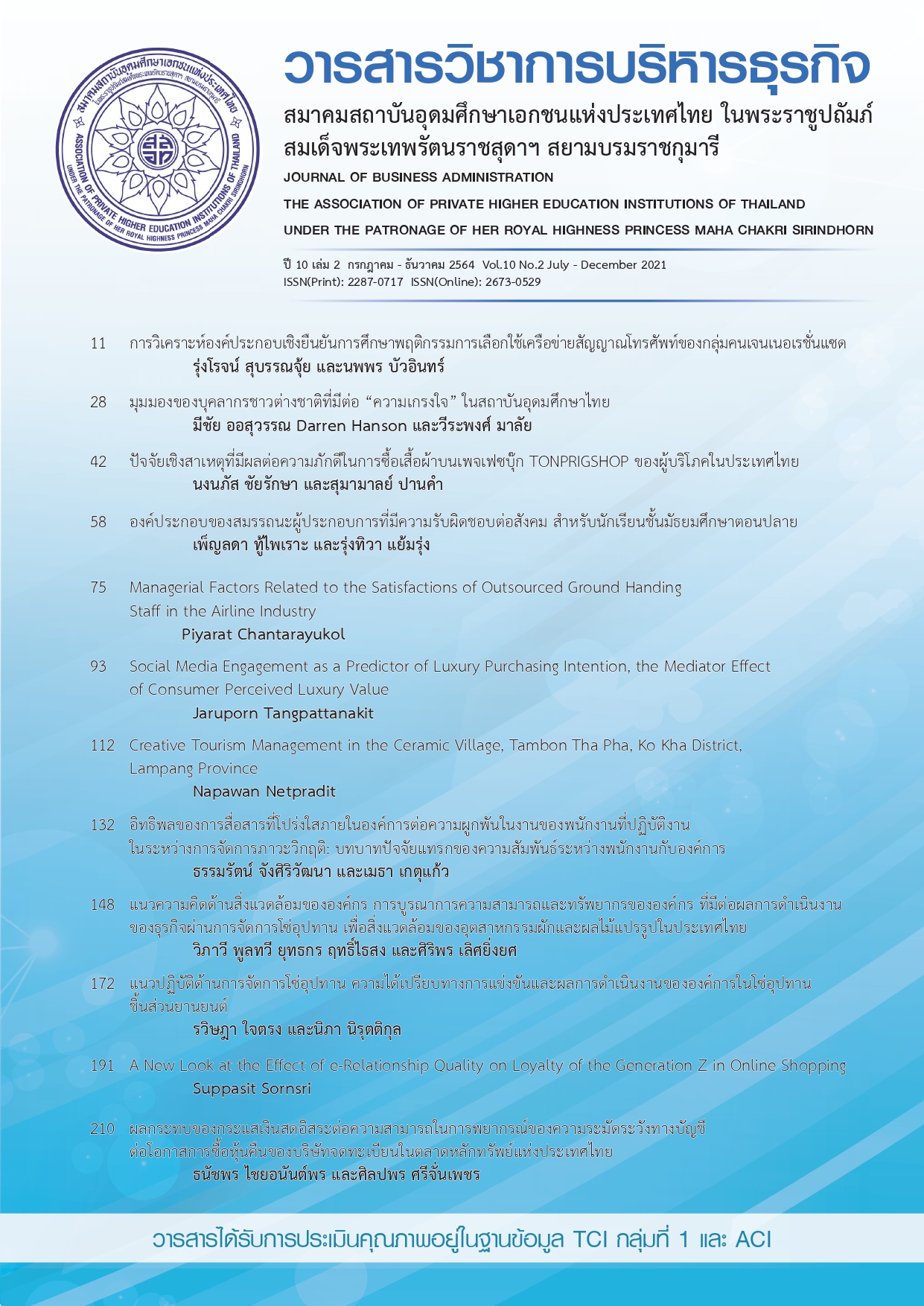Organization Mindset Toward Environment Integration of Capability and Organizational Resources on Business Performance : The Mediating Effect of Green Supply Chain Management of Fruit and Vegetable Processing Industry in Thailand
Keywords:
Organization Mindset toward Environment, Integration of Capability and Organizational Resources, Green Supply Chain Management, Business Performance, Fruit and Vegetable Processing IndustryAbstract
The objectives of this research were 1) to analyze the influence of organization mindset toward environment, integration of capability and organizational resources, and green supply chain management that affected the business performance of fruit and vegetable processing industry in Thailand, and 2) to study problems and guidelines for the development of green supply chain management in fruit and vegetable processing industry in Thailand. This research was based on the mixed method. For quantitative approach, data were collected from 214 executives through a questionnaire set. The structural equation modeling method (SEM) was employed to analyze the collected data. For the qualitative approach, it was based on an in-depth interview with the executives for ensuring the research results and gathering information related to the guidelines for the development of green supply chains management. The results found that 1) both organization mindset toward environment and Integration of capability and organizational resources have the positive direct effects on green supply chain management, 2) the direct effects of organization mindset toward environment and Integration of capability and organizational resources on business performance are insignificant, 3) Green supply chain management has a positive direct effect on business performance, and 4) organization mindsets toward environment and Integration of capability and organizational resources have the indirect effects on business performance through a mediation of green supply chain management. These results are in line with the analysis of qualitative research. The findings of this research can be applied by the executives to suit their organizational context. Moreover, the finding can be utilized as a development guideline for green supply chain management in order to enhance business performance, such as profitability, cost reduction, making a good image for business, and reducing environmental impact.
References
Abdel-Baset, M., Chang, V., & Gamal, A. (2019). Evaluation of the green supply chain management practices: A novel neutrosophic approach. Computers in Industry, 108, 210-220.
Abdeen, F.N., & Sandananyake, Y.G. (2018). Facilities management supply chain: Function, flows and relationship. Procedia Manufacturing, 17, 1104–1111.
Abdul-Rashid, S.H., Sakundarini, N., Raja Ghazilla, R.A., & Thurasamy, R. (2017). The impact of sustainable manufacturing practices on sustainability performance: Empirical evidence from Malaysia. International Journal of Operations & Production Management, 37(2), 182-204.
Afsar, B., Badir, Y., & Kiani, U.S. (2016). Linking spiritual leadership and employee pro-environmental behavior: the influence of workplace spirituality, intrinsic motivation, and environmental passion. Journal of Environmental Psychology, 45, 79-88.
Agrawal, S., Singh, R.K., & Murtaza, Q. (2015). A literature review and perspectives in reverse logistics. Resources, Conservation and Recycling, 97, 76-92.
Ahi, P., & Searcy, C. (2015). An analysis of metrics used to measure performance in green and sustainable supply chains. Journal of Cleaner Production, 86, 360–377.
Ahmed, W., Asim, M., & Manzoor, S. (2020). Importance and challenges of green supply chain management in healthcare. EJBMR, European Journal of Business and Management Research, 5(2), 1-8.
Akintoye, A., McIntosh, G., & Fitzgerald, E. (2000). A survey of supply chain collaboration and management in the UK construction industry. European Journal of Purchasing and Supply Management, 6, 159–168.
Arseculeratne, D., & Yazdanifard, R. (2014). How green marketing can create a sustainable competitive advantage for a business. International Business Research, 7(1), 130-137.
Bahremand, M., & Karimi, R. (2016). Identify and evaluate the factors influencing technological capapilities using fuzzy dematel techniques at science and technology parks. Case study: Knowleadge-based companies at Mashhad’s science and technology park. Journal of Engineering and Applied Sciences, 11(4), 678-683.
Barney, J. B. (1991). Firm resources and sustained competitive advantage. Journal of Management, 17(1), 99-120.
Benachio, G. L. F., Freitas, M. C. D., & Tavares, S. F. (2019). Green supply chain management in the construction industry: A literature review. In IOP Conference Series: Earth and Environmental Science, 225(1), 12011.
Carvalho, L. S. D., Stefanelli, N. O., Viana, L. C., Vasconcelos, D. S. C., & Oliveira, B. G. (2020). Green supply chain management and innovation: a modern review. Management of Environment Quality: An International Journal, 31(2), 470-482.
Chen, Y., Okudan, G. E., & Riley, D. R. (2010). Sustainable performance criteria for construction method selection in concrete buildings. Automation in Construction, 19(2), 235-244.
Coyle, J. J., Thomchick, E. A., & Ruamsook, K. (2015). Environmentally sustainable supply chain management: an evolutionary framework. In Marketing Dynamism & Sustainability: Things Change, Things Stay the Same. (pp. 365-374). Springer, Cham.
Cronbach, L. J. (1970). Essentials of Psychological Test (5thed.). New York: Harper Collins. Department of International Trade Promotion, Ministry of Commerce, Thailand. (2020). Fact sheet fruit and vegetable processing industry in Thailand. Retrieved from https://ditp.go.th/ditp_web61/ article_sub_view.php?filename= contents_ attach/607169/607169.pdf&title=607169&cate=751&d=0.
Dwivedi, Y. K., Hughes, L., Ismagilova, E., Aarts, G., Coombs, C., Crick, T.,….. & Galanos, V. (2019). Artificial intelligence (AI): multidisciplinary perspectives on emerging challenges, opportunities, and agenda for research, practice and policy. International Journal of Information Management, 57, 1-47.
Eltayeb, T., & Zailani, S. (2009). Going green through green supply chain initiatives towards environmental sustainability. Operations & Supply Chain Management, 2(2), 93-110.
Fernando, Y., Bee, P.S, Jabbour, C. J. C., & Thome, A. M. T. (2018). Understanding the effects of energy management practices on renewable energy supply chains: implications for energy policy in emerging economies. Energy Policy, 118, 418-428.
Gao, Y. (2017). Business leaders’ personal values, organisational culture and market orientation. Journal of Strategic Marketing, 25(1), 49-64.
Ghobakhloo, M., Tang, S. H. N., Zulkifli, N., & Ariffin, M. K. A. (2013). An integrated framework of green supply chain management implementation. International Journal of Innovation, 4(1), 86-89.
Glavas, A., Senge, P., & Cooperrider, D. (2010). Building a green city on a blue lake: A model for building a local, sustainable economy. Journal of People and strategy, 33(1), 26-33.
Graves, L. M., Sarkis, J., & Zhu, Q. (2013). How transformational leadership and employee motivation combine to predict employee proenvironmental behaviors in China. Journal of Environmental Psychology, 35, 81-91.
Habib, A., Bao, Y., & IImudeen, A. (2020). The impact of green entrepreneurial orientation, market orientation and green supply chain management practices on sustainable firm performance. Cogent Business & Management, 7(1), 1-26.
Hair, J. F., Black, W.C., Babin, B. J., & Anderson, R. E. (2010). Multivariate data analysis. (7thed.). Upper saddle river. New Jersey: Pearson Prentice Hall.
Hofer, C., & Schendel, D. (1978). Strategy formulation: Analysis concepts. St. Paul, MN: West Publishing.
Huscroft, J.R., Hazen, B.T., Hall, D.J., Skipper, J.B., & Hanna, J.B. (2013). Reverse logistics: Past research, current management issues, and future directions. International Journal of Logistics Management, 24, 304–327.
Jabbour, C. J. C., Mauricio, A. L., & Jabbour, A. B. L. S. (2017). Critical success factors and green supply chain management proactivity: shedding light on the human aspects of this relationship based on cases from the Brazilian industry. Production Planning and Control, 28(6–8), 671–683.
Jantunen, A., Ellonen, H. K., & Johansson, A. (2012). Beyond appearances–do dynamic capabilities of innovative firms actually differ?. European Management Journal, 30, 141-155.
Jiménez-Jiménez, D., & Sanz-Valle, R. (2011). Innovation, organizational learning, and performance. Journal of business research, 64, 408-417.
Kamolkittiwong, K., & Phruksaphanrat, B. (2015). The Influence of green supply chain management on business performance of electronic industry in Thailand. International Journal of Management and Applied Science (IJMAS), 1(11), 54-59.
Karatekin, K. (2014). Social studies pre-service teachers’awareness of solid waste and recycling. Procedia - Social and Behavioral Sciences, 116, 1797-1801.
Kassel, K., Rimanoczy, I., & Mitchell, S. F. (2016). The sustainable mindset: Connecting being, thinking, and doing in management education. In Academy of management proceedings (pp.16659). Briarcliff Manor, NY 10510: Academy of Management.
Kline, R. B. (2011). Principles and practice of structural equation modeling. (3rded.). New York. The Guilford Press.
Koukiasa, M. (2011). Sustainable facilities management within event venues. Worldwide Hospitality and Tourism Themes, 3(3), 217-228.
Kylaheiko, K., Jantunen, A., Puumalainen, K., Saarenketo, S., & Tuppura, A. (2011). Innovation and internationalization as growth strategies: the role of technological capabilities and appropriability. International Business Review, 20(5), 508-520.
Laari, S., Toyli, J., & Ojala, L. (2017). Supply chain perspective on competitive strategies and green supply chain management strategies. Journal of Cleaner Production, 141, 1303-1315.
Loetyingyot, S., Jadesadalug, V., & Sansook, J. (2015). Green logistics management capabilities toward stakeholders responsiveness and business performance of paper industrial in Thailand. Journal of Business Administration, 38(147), 40-67
Lui, J. Y., Low, S.P., & He, X. (2012). Green practices in the Chinese building industry: drivers and impediments. Journal of Technology Management in China, 7(1), 50-63.
Millar, C., Hind, P., & Magala, S. (2012). Sustainability and the need for change: organisational change and transformational vision. Journal of Organizational Change Management, 25(4), 489-500.
Mitra, S., & Datta, P. P. (2014). Adoption of green supply chain management practices and their impact on performance: an exploratory study of Indian manufacturingfirms. International Journal of Production Research, 52(7), 2085-2107.
Patton, M. O. (1990). Qualitative evaluation and research methods (2nd ed.). California: SAGE Publication.
Rai, A., Arikan, I., Pye, J., & Tiwana, A. (2015). Fit and misfit of plural sourcing strategies and IT enabled process integration capabilities: Consequences of firm performance in the U.S. electric utility industry. MIS Quarterly, 39(4), 865-885.
Robertson, J. L., & Barling, J. (2015). Introduction. In J. L. Robertson & J. Barling (Eds.). The psychology of green organizations (pp. 3–11). USA : Oxford University Press.
Rovinelli, R. J., & Hambleton, R. K. (1977). On the use of content specialists in the assessment of criterion referenced test item validity. Journal of Educational Research Association, 2, 49-60.
Shi, Q., Zuo, J., Huang, R., Huang, J., & Pullen, S. (2013). Identifying the critical factors for green construction- an empirical study in China. Habitat International, 40, 1-8.
Song, H., & Gao, X. (2018). Green supply chain game model and analysis under revenue-sharing contract. Journal of Cleaner Production, 170, 183-192.
Sousa Filho, J. M. de, Wanderley, L. S. O., Gomez, C. P., & Farache, F. (2010). Strategic corporate social responsibility management for competitive advantage. BAR - Brazilian Administration Review, 7(3), 294-309.
Srivastava, S.K. (2007). Green supply chain management: a state-of-the-art literature review. International Journal of Management Reviews, 9(1), 53-80.
Susanty, A., Sari, D. P., Rinawati, D. I., & Setiawan, L. (2018). Impact of internal driver on implementation of GSCM practice. Proceedings of the International Conference on Industrial Engineering & Operations Management (pp. 149-156). Bandung: Indonesia.
Van der Voordt, T. (2017). Facilities management and corporate real estate management: FM/CREM or FREM?. Journal of Facilities Management, 15(3), 244-261.
Van, H, B., & Lyon, T.P. (2013) Cleaner production in small firms taking part in Mexico’s sustainable supplier program. Journal of Cleaner Production, 41, 270-282.
Wu, G.C. (2013). The influence of green supply chain integration and environmental uncertainty on green innovation in Taiwan’s industry. Supply Chain Management: An International Journal, 18(5), 539-552.
Zailani, S., Govindan, K., Iranmanesh, M., Shaharudin, M. R., & Sia, C. Y. (2015). Green innovation adoption in automotive supply chain: The Malaysian case. Journal of Cleaner Production, 108, 1115-1122.
Zhou, C., Xia, W., Feng, T., Jiang, J., & He, Q. (2019). How environmental orientation influences firm performance: The missing link of green supply chain integration. Sustainable Development, 28(4), 685-696.
Zhu, Q., Geng Y., Sarkis, J., & Lai, K. (2011). Evaluating green supply chain management among Chinese manufacturers from the ecological modernization perspective. Transportation Research Part E: Logistics and Transportation Review, Elsevier, 47(6), 808-821.
Zhu, Q., Sarkis, J., & Lai, K. (2008). Confirmation of a measurement model for green supply chain management practices implementation. International Journal of Production Economics, 111(2), 261-273.

Downloads
Published
How to Cite
Issue
Section
License
บทความที่ลงตีพิมพ์ในวารสารวิชาการบริหารธุรกิจ สมาคมสถาบันอุดมศึกษาเอกชนแห่งประเทศไทยต้องเป็นบทความที่ไม่เคยได้รับการตีพิมพ์เผยแพร่ หรืออยู่ระหว่างการพิจารณาตีพิมพ์ในวารสารอื่นๆ การละเมิดลิขสิทธิ์เป็นความรับผิดชอบของผู้ส่งบทความโดยตรง


